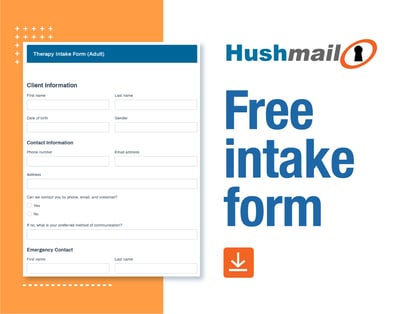Find your best-fit client using a secure contact form
A secure contact form can make practice management more efficient by helping you find the clients who are the best fit for your practice – but only...

Get a free therapy intake form template! And find out how to customize it so it fits your practice. We talked to nine counselors about their best practices.
Are you confused by what needs to be on your intake form when you take on a new client?
If you search for therapy intake forms, you’ll find they’re all a little different. So how do you know what’s right for your practice?
The right intake form doesn’t just check your admin boxes. If you have a well-thought-out form, it can help you care for your clients.
First things first, we promised you a free intake form template.
Submit your information below to get your free PDF right away.

However, one form doesn’t fit every practice perfectly. Although you can take that template and use it “as is,” that may not be the best strategy.
A great counseling intake form is tailored to your practice.
How do you tailor your form?
Let’s find out…
We talked to nine therapists about what works for them.
One purpose of an intake questionnaire is to collect the necessary information you need for your files. So… name, address, phone number, etc.
But you can also collect information that will help direct your method of therapy.
The information you collect on the second part of the form will be different for every therapist. That’s why it’s a bad idea to use a template as is.
It wastes an opportunity to find out valuable information that will help you relate to your clients and provide the best care.
You’ll want to collect the basic information you need for your files:
According to Karyetta Walker, EdD, LCMHC, it’s important to pay attention to your state’s requirements. Otherwise, you could find yourself in a situation where you’re treating a person illegally.
“In the state of North Carolina, there are no such things as grandparents' rights,” says Dr. Walker. “So just because a grandparent has a grandchild, niece, or nephew living with them, they may not have proper documentation to say they can sign that kid up for services. And therapists often will forget to ask that question.”
You can find your state’s requirements by checking with your state board.
Also, be sure to ask the detailed questions that will help you manage your practice. For example, if you see children, ask what grade they’re in.
“You want their school and the grade,” says Dr. Walker. “Because I need to be careful about what kind of slot I give them. For my younger kids, I typically give them early morning appointments. For those who are in middle school and high school, I try to target more afternoons. Ask for their class schedules and when they have their elective courses such as PE, Art, and Band that may not have the same impact of missing core class instruction time."
|
The questions on the next part of the form really depend on your practice and the extra information you’d like to have. By this time, you’ve likely already vetted your client over email or the phone before the first session. These next questions are about filling in the blanks and they depend on your practice.
For example, if you’re a marriage and family therapist, you might consider these questions about family history:
Notice those questions that start with “If yes…?” If you use an online form, you can make a follow-up question visible depending on the answer to a question.
For example, if a client responds that they have children, you can make a question that asks about the relationship appear. This is why you should consider using an online form instead of a PDF, which we’ll talk more about later.
|
You might also want to ask questions about school and work, as well as hobbies and recreational activities. Learning about good and bad habits (e.g., exercise, sleep routines, smoking, drinking, etc.) will also give you a clearer picture of your client’s challenges.
|
Including questions and prompts about why they’re seeking care can help you fill in gaps if you didn’t get that information when they first contacted you.
|
Don’t forget, the perfect place to start is with a template, and we’re offering you a free PDF. However, keep in mind that it’s best to recreate it as an online therapy intake form and customize it to fit your practice.

How you decide to use your intake form depends on how you like to manage your practice. After you make sure you have the information required by your state, it’s really up to you.
However, there are a few best practices that apply to most counselors.
Many therapists have a brief conversation with a potential client either on the phone or through email to determine if they’d be a good fit. In that case, questions about why someone wants therapy have probably already been answered. If you don’t feel like a question is useful, don’t ask it.
|
|
Because your clients are giving you private and possibly sensitive information about themselves, confidentiality is very important. For this reason, make sure that you’re securing the information. One way is to use a HIPAA-compliant online form service such as Hush™ Secure Forms.
If you’re still using paper forms, it’s time to upgrade to online. Your clients will thank you, and you’ll thank yourself.
While a PDF form (like our free template) is better than paper and will get the job done, an online form is vastly superior.
Online forms serve the same purpose as PDF forms, but they do a better job of keeping confidential information secure. They’re also easier for your clients to deal with. They don’t have to print, fill out, scan, and upload information like they do with PDFs.
Online forms also speed up the intake process. As soon as you take on a new client, you can send them your forms to fill out in the comfort of their home. Then, they can send them right back for you to review before the first appointment.
Here are some more reasons why online forms are better than PDFs:
| Security. PDF forms that are sent back and forth using regular email like Outlook or Gmail aren’t very secure. Your clients’ information could fall into the wrong hands. When you use a HIPAA-compliant online form service, intake forms can be securely filled out, submitted, and filed away. |
|
| They’re easier for your clients to fill out. It can be hard to squeeze everything you want to say into the pre-sized fields on a PDF. Online forms give your clients all the space they need and adapt to their screen. |
|
| They’re easier for you to edit and file away. Updates are simple to make and result in one form, preventing you from sending out the wrong version by mistake. Submitted forms are filed away in one place and easy to find. | |
| You can add fields that are only visible to certain clients. (E.g., fields asking for parent information will only show up if the birth date indicates that the client is a minor.) That way your clients don’t have to read through questions that don’t apply to them. |
We understand that switching from PDFs (or paper) to online forms might sound daunting. Maybe you worry:
It’s not as complicated as you think! Our specialists are happy to answer any questions you have with no obligation to sign up for anything. Our specialists are just here to help you get the information you need.
Schedule a consultation with a Hushmail specialist.
It’s important to use a little common sense when looking for a good intake form template or creating your own. Here are some things to think about:

Here are some lingering questions you might have about intake forms:
Yes. Your clients are giving you sensitive information about their health. It needs to be protected. Make sure that you use a HIPAA-compliant form service that comes with a business associate agreement (BAA).
Not sure what a BAA is? Find out in our article Do you need a Business Associate Agreement?
Different practitioners have different preferences for how they do things, so the answer to this question is, it depends.
For example, “sometimes people don't like to ask about race,” says Dr. Walker. “But I have people fill that out because I don't want to assume that you're something that you're not. We're such a diverse culture now. Understanding race and culture allows me to avoid being insensitive and harmful in practice. It says that I want to learn to better help you, not force you to work through my personal lens.”
Some practitioners have learned through experience that it’s best to not ask specific questions about sensitive topics, preferring instead to let that come out during sessions.
|
|
If you’re early in your career, your clinical supervisor can help you decide how to handle sensitive questions on your forms.
Do you wonder how your clients feel when filling out your intake form? Christen Hansel is a counselor and a client. Here’s her perspective as a client:
|
Practitioners vary in how they handle updating their intake form. According to Dr. Walker, there’s no need to have your clients revisit their client intake form. “If there's another traumatic event while they're working with me, that's just something I document,” says Dr. Walker. “Otherwise, just make sure that your consents are up to date, verify current contact information (e.g., emails, contact number, address), insurance, and other administrative information and that your consent forms are signed every 12 months. If you bill insurance, you may want to verify their insurance monthly, because you can end up being left with writing off a bill due to non-payment.”
|
However, Anita Adams, LPC, and Sarah Stein-Wolf, LCMHC, RPT, try to update their forms as changes occur or annually. And Crystal Matti, LMSW, updates her questionnaires “if they move or have a significant life change, or have a change in therapy goals.”
A signature isn’t necessary as long as it’s limited to intake questions. If you’re including a consent form or clause that gives permission to share a client’s information with people not considered part of treatment or payment, it needs a signature.
Once you find an intake form you like, you can easily recreate it and customize it with a form builder like Hush™ Secure Forms. Just by dragging and dropping, you can add your branding, a variety of different fields, including fields for signatures, and a lot more.
.gif?width=856&name=Cropped-help%20site_A%20quick%20start(1).gif)
Make sure the form is tailored to your practice by asking thoughtful questions. And use a HIPAA-compliant online form service to make sure the information is secure.
A customized intake form that collects the right information ensures you start off on the right foot with your clients.
Interested in taking the next step?
A secure contact form can make practice management more efficient by helping you find the clients who are the best fit for your practice – but only...
Using an EHR is a great way to manage and maintain clinical data in your practice. But there's one crucial gap many EHR systems leave, which could...
Many see faxing as a dependable way to communicate, but it can also be slow and error-prone. Find out how to use secure online forms instead to...